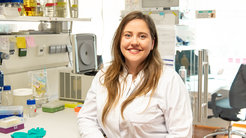Ina Huppertz starts her research group
Research on RNA-binding proteins and ageing
Ina Huppertz has started her Max Planck Research Group at the Max Planck Institute for Biology of Ageing. Her group will use stem cells of the nervous system to study how proteins that bind to RNA affect metabolism and ageing.

If cells need a certain protein, they first read the corresponding gene and transcribe it into RNA, which then serves as a "blueprint" for the production of the protein. This process must be precisely controlled and monitored to ensure that no errors occur. This is what RNA-binding proteins are for. They bind to the RNA and stabilize it, ensure that it is correctly transported out of the cell nucleus, and also make sure that it is degraded again when it is no longer needed.
During her doctoral studies, Ina Huppertz helped develop a technique that can be used to determine exactly which RNAs the RNA-binding proteins are located on at any given time in the cell. As part of her postdoctoral position, she worked on an unexpected group of proteins that were bound to RNA: Enzymes that are active in cell metabolism. Unlike classical RNA-binding proteins, she found that the RNA could regulate the enzymes, not the enzymes the RNA.
Stem cells of the nervous system
With her new group at the Max Planck Institute for Biology of Ageing, Huppertz now wants to use ageing stem cells of the nervous system to study what happens to RNA-binding proteins in old age. These stem cells need a switch in their energy production for their differentiation. This change functions less well in old age. Huppertz now wants to investigate whether and how this switch in metabolism is controlled by RNA-binding proteins.
"The Max Planck Institute for Biology of Ageing is an incredibly well-equipped institute where research is conducted at the very highest scientific level. Ageing is an interplay of everything that makes up an organism, and that is brought together here in the same way," Huppertz says. "Being here is like a dream come true."
About the person
Ina Huppertz studied and earned her PhD at the University of Cambridge in the United Kingdom. She then moved to EMBL (European Molecular Biology Laboratory) in Heidelberg in 2015 as a postdoctoral researcher in Matthias Hentze's research group. After an 8-month stay as a research associate at the European Research Council (ERC) office in Brussels, Belgium, she started her Max Planck Research Group at the Max Planck Institute for Biology of Ageing in August 2022.












